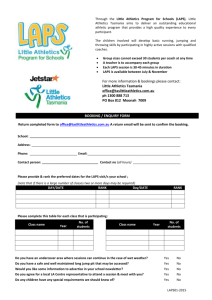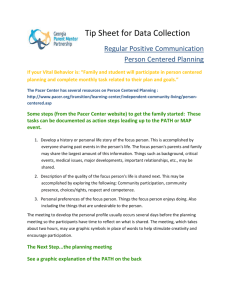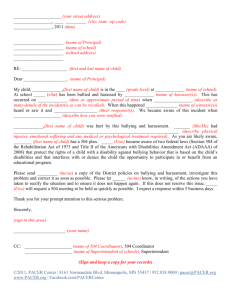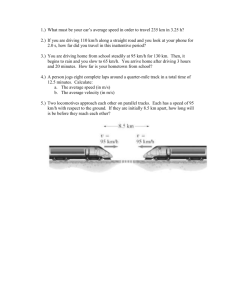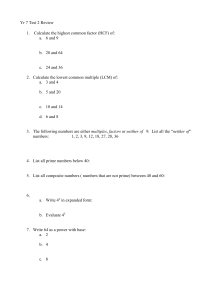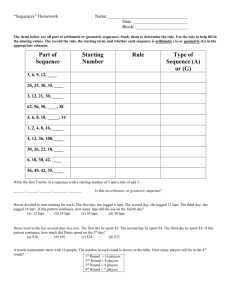fitness portfolio project 3
advertisement
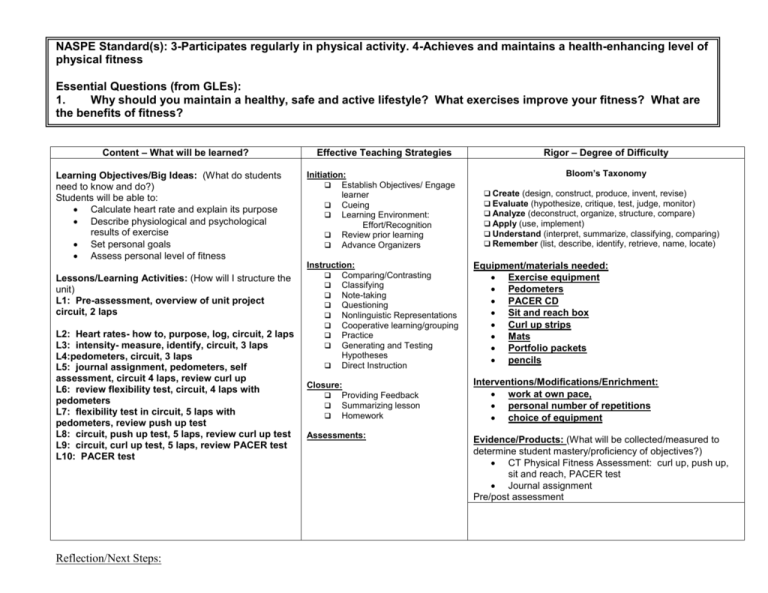
NASPE Standard(s): 3-Participates regularly in physical activity. 4-Achieves and maintains a health-enhancing level of physical fitness Essential Questions (from GLEs): 1. Why should you maintain a healthy, safe and active lifestyle? What exercises improve your fitness? What are the benefits of fitness? Content – What will be learned? Learning Objectives/Big Ideas: (What do students need to know and do?) Students will be able to: Calculate heart rate and explain its purpose Describe physiological and psychological results of exercise Set personal goals Assess personal level of fitness Lessons/Learning Activities: (How will I structure the unit) L1: Pre-assessment, overview of unit project circuit, 2 laps L2: Heart rates- how to, purpose, log, circuit, 2 laps L3: intensity- measure, identify, circuit, 3 laps L4:pedometers, circuit, 3 laps L5: journal assignment, pedometers, self assessment, circuit 4 laps, review curl up L6: review flexibility test, circuit, 4 laps with pedometers L7: flexibility test in circuit, 5 laps with pedometers, review push up test L8: circuit, push up test, 5 laps, review curl up test L9: circuit, curl up test, 5 laps, review PACER test L10: PACER test Reflection/Next Steps: Effective Teaching Strategies Initiation: Establish Objectives/ Engage learner Cueing Learning Environment: Effort/Recognition Review prior learning Advance Organizers Rigor – Degree of Difficulty Bloom’s Taxonomy Create (design, construct, produce, invent, revise) Evaluate (hypothesize, critique, test, judge, monitor) Analyze (deconstruct, organize, structure, compare) Apply (use, implement) Understand (interpret, summarize, classifying, comparing) Remember (list, describe, identify, retrieve, name, locate) Instruction: Comparing/Contrasting Classifying Note-taking Questioning Nonlinguistic Representations Cooperative learning/grouping Practice Generating and Testing Hypotheses Direct Instruction Equipment/materials needed: Exercise equipment Pedometers PACER CD Sit and reach box Curl up strips Mats Portfolio packets pencils Closure: Providing Feedback Summarizing lesson Homework Interventions/Modifications/Enrichment: work at own pace, personal number of repetitions choice of equipment Assessments: Evidence/Products: (What will be collected/measured to determine student mastery/proficiency of objectives?) CT Physical Fitness Assessment: curl up, push up, sit and reach, PACER test Journal assignment Pre/post assessment Lesson: 4 Lesson:5 Learning Objectives: Lesson: 1 Learning Objectives Learning Objectives Learning Objectives Learning Objectives Identify fitness components and exercises Take heart rate Identify measurement Analyze level of intensity Use pedometers, understand what it measures Physiological, psychological benefits of exercise Cues: slow, steady pace, long, deep breaths Cues: slow, steady pace, long, deep breaths Activities: Intro, demo 10 fitness stations Complete 30 sec each station Distribute folders, take preassessment Overview of project Review fitness componentsstudents name exercises in stations for each Week 1 exercise log 2 laps Review preassessments, and fitness components Activities: Review Heart Rate and sheets in folder Take resting HR, log on sheet Circuit-40 sec each Retake HR-log # 2 laps Game Review HR, purpose and measurement Activities: Review intensity and how to ID Take HR-log Circuit-45 sec each 3 laps-partner jogpreset based on L1-2, give conversation topic Retake HR-log Collect Log 1, distribute Log 2 game Assessments: Pre-assessment Assessments: Self- HR Assessments: self-intensity Reflection/Next Steps Lesson: 2 Lesson: 3 Cues: intensity: low-no sweat, normal breath, talk or sing. Moderate-sweat after 10 minutes, can talk but not sign, heavier breath. Highsweat, cannot talk or sing, heavy breath Cues: muscles, mood Cues: set to “0”, waist, no shaking Activities: distribute pedometers review use take HR-log circuit-50 sec each 3 laps with same partner (or different if not well matched)-new conversation topic Retake HR-log, steps # Discuss benefits of partner jog game Assessments: self-steps Activities: review journal assignment pedometers HR Circuit-1 min each Self assess into 1 of 2 groups: Olympic speed, human speed 4 laps- ball pass drill Retake HR-log Collect log 2, distribute log 3 Review curl upexercises to improve Assessments: Self-group assignment Lesson: 6 Lesson: 7 Lesson: 8 Lesson: 9 Lesson:10 Learning Objectives Learning Objectives: Learning Objectives Learning Objectives Learning Objectives Physiological benefits of exercise Perform the flexibility test Perform the push up test Perform the curl up test Perform the PACER test Cues: straight leg, fingers lined up together, hold position Cues: 90’ elbow, straight back, with the beat, Cues: head touches floor, knees bent, fingers past line, move to the beat Cues: cross the line by the beep, slow, steady breathing Activities: Activities: Review push up test Activities: Activities: Review PACER test HR Circuit-45 sec each Students in pregrouped partners with lap logs and fitness sheets Students perform PACER in 2 heats Cues: muscles used, mood, feelings Activities: HR, pedometer steps Circuit-1 min each 4 laps (time permits), PACER practice Review flexibility test Review flexibility test procedures Bring fitness sheets to flexibility stationT marks results on sheet HR, pedometer steps Circuit-1 min each 4 laps (time permits) PACER practice Review push up test Assessments: teacher observation Reflection/Next Steps: Assessments: sit and reach test HR, pedometers Circuit-45 sec each Students in groups of 3 (pre-grouped): 1 performs, 1 at head, 1 at feet Students have fitness sheet with them Perform push up test in 3 heats 4 laps (time permits) PACER practice Review curl up test Assessments: push up test Review curl up test HR Circuit-45 sec each Students in groups of 3 (pre-grouped): 1 performs, 1 at head, 1 at feet Students have fitness sheet with them Perform push up test in 3 heats 4 laps (time permits) PACER practice Review PACER test Assessments: curl up test Assessments: PACER Lesson: 1 Reflection/Next Steps Lesson: 2 Lesson: 3 Lesson: 4 Lesson:5

